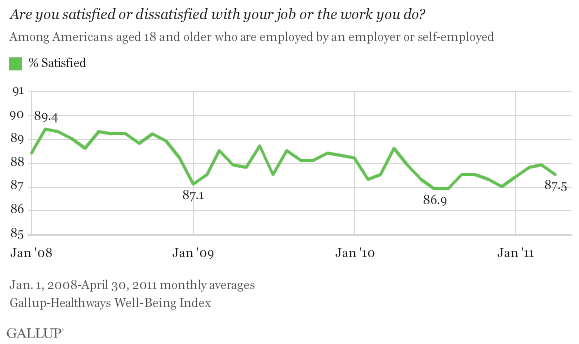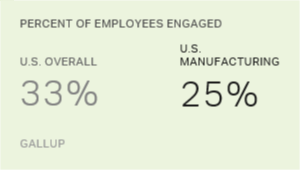WASHINGTON, D.C. -- Fewer American employees are satisfied with their jobs today than were before the 2008 economic crisis, though the vast majority of American workers remain satisfied with their jobs. The Gallup-Healthways Well-Being Index found 87.5% of workers satisfied with their job in April, continuing the trend of lower levels found since early 2009. Satisfaction is, however, up from the low of 86.9% in July and August 2010, but still below the high of 89.4% in February 2008.

About 9 in 10 American workers reported being satisfied with their jobs throughout 2008. Job satisfaction first dropped below 88% in January 2009, as the effects of the financial crisis started to negatively affect workplaces across the United States. In the summer of last year, job satisfaction fell to its lowest point of 86.9%.
Job satisfaction is one of four questions the Gallup-Healthways Well-Being Index asks to measure American workers' perceptions of their workplaces. The other three questions ask employees whether they get to use their strengths at work every day, if their supervisor is more like a partner than a boss, and if their supervisor creates a trusting and open work environment. Each of these three items has remained steady or even improved since 2008. Overall job satisfaction is the only one of the four that has declined over the past two and half years.
Job Satisfaction Lowest for Low-Income Workers, Blacks
Job satisfaction is down the most among Hispanics and those with less education in the first four months of 2011 compared with 2008. However, workers' satisfaction across all demographic groups is lower or remains statistically unchanged in 2011 when compared with 2008.
Across age groups, young adults' satisfaction has decreased the most and seniors' the least. Seniors also have the highest job satisfaction in 2011 among all groups measured, at 94.8%. In general, job satisfaction increases with age, with young adults the least satisfied.
While black American workers' job satisfaction is essentially the same in 2011 as it was in 2008, they have consistently been among the least likely to be content with their work.
Workers with an annual household income of less than $36,000 are also among the least likely to be satisfied with their jobs in 2011, at 82.1%. At the other end of the spectrum are high-income workers -- those with an annual income of $90,000 or more -- who are among the most satisfied, at 91.9%. Additionally, job satisfaction has declined more among low-income workers than among those with higher incomes.
Job satisfaction has dropped more among men than among women, with both genders now about equally likely to be satisfied.

Bottom Line
Job satisfaction provides a broad measure of how content American workers are in their jobs. American workers generally say they are satisfied with their work, though slightly fewer than in 2008. It is unclear the cause of the decline in job satisfaction, though in recent years there have been reports of employees taking on more and less-than-ideal work as companies reduced staff and of workers having to take jobs they are overqualified for after losing their previous job. Concerns about job security, heightened by high unemployment, are likely playing a role as well.
It is also possible the challenging labor market may have made some American workers look more favorably upon their jobs, and thus the decline since 2008 is not as great as it could have been.
Certain demographic groups, however, are better off than others. Workers aged 65 and older and high-income Americans are more likely to be satisfied with their jobs, while low-income employees and blacks are among the least likely to be satisfied.
About the Gallup-Healthways Well-Being Index
The Gallup-Healthways Well-Being Index tracks U.S. and U.K. well-being and provides best-in-class solutions for a healthier world. To learn more, please visit well-beingindex.com.
Survey Methods
Results are based on telephone interviews conducted as part of the Gallup-Healthways Well-Being Index survey Jan. 1-April 30, 2011, with a random sample of 61,889 adults, aged 18 and older, living in all 50 U.S. states and the District of Columbia, selected using random-digit-dial sampling.
For results based on the total sample of national adults, one can say with 95% confidence that the maximum margin of sampling error is ±1 percentage point.
Interviews are conducted with respondents on landline telephones and cellular phones, with interviews conducted in Spanish for respondents who are primarily Spanish-speaking. Each sample includes a minimum quota of 400 cell phone respondents and 600 landline respondents per 1,000 national adults, with additional minimum quotas among landline respondents for gender within region. Landline telephone numbers are chosen at random among listed telephone numbers. Cell phone numbers are selected using random-digit-dial methods. Landline respondents are chosen at random within each household on the basis of which member had the most recent birthday.
Samples are weighted by gender, age, race, Hispanic ethnicity, education, region, adults in the household, and phone status (cell phone only/landline only/both, cell phone mostly, and having an unlisted landline number). Demographic weighting targets are based on the March 2010 Current Population Survey figures for the aged 18 and older non-institutionalized population living in U.S. telephone households. All reported margins of sampling error include the computed design effects for weighting and sample design.
In addition to sampling error, question wording and practical difficulties in conducting surveys can introduce error or bias into the findings of public opinion polls.
For more details on Gallup's polling methodology, visit www.gallup.com.
